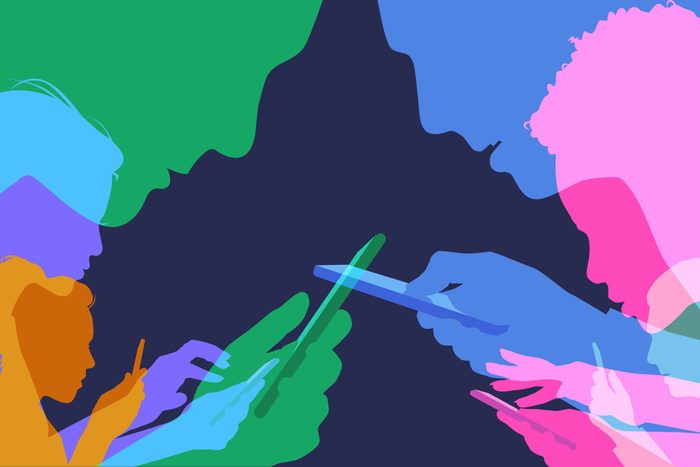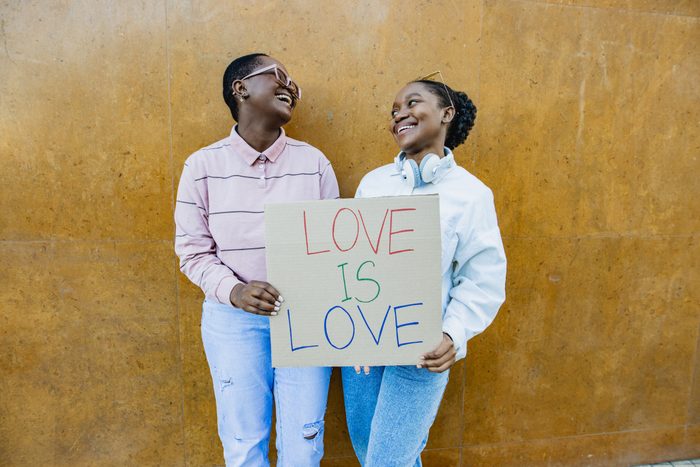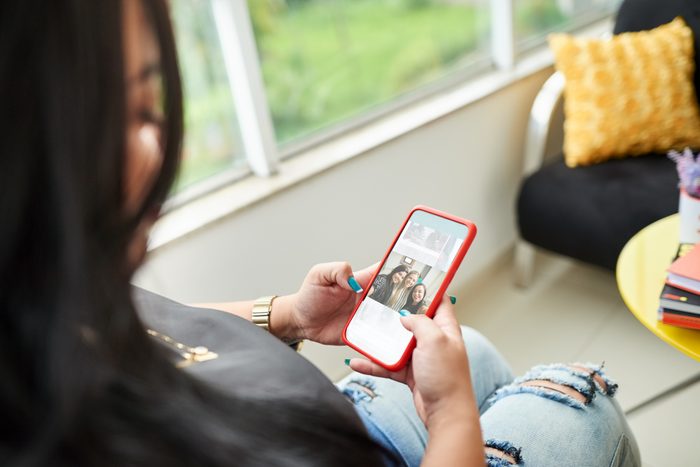Your life would change in many ways if social media never existed. Here's how.

15 Things That Could Happen If Social Media Disappeared


It would be much harder to find our people
Social media allows people to connect with peers and members of different social groups that they otherwise may not have had the chance to meet in real life—whether it’s others with the same rare illness, a niche fandom or supporters of the same social justice cause or movement.
“This connection often has benefits to the individual, particularly when they are able to connect with and gain support from a social group that would not otherwise be available to them,” Jansen says. “For example, individuals with mental health concerns can reach out to others with the same condition for support, or young adults may find connection with others who have the same gender identity or sexual orientation who might not otherwise be in their immediate community.”

We wouldn’t compare ourselves to others as much
One of the side effects of seeing what everyone we know is up to at all times, at every stage of their existence, is that it’s difficult not to hold their perceived successes up against our own—and find that we’re falling short. Unsurprisingly, this isn’t great for our mental well-being. “The constant comparison to the idealized versions of others’ lives can cause decreased satisfaction with the reality of our life,” Jansen says.
In fact, an increase in self-esteem is often a benefit of quitting social media. “Social media use in general has been associated with body dissatisfaction, in part because users consistently compare themselves to the perfectly positioned and sometimes edited images they see on others’ accounts,” explains Jansen. One of the more disturbing trends in this arena are overt or covert pro-eating disorder groups, which often use tags like #thinspo or #fitspo to reinforce disordered eating habits under the guise of community support.

We’d be better (and safer) drivers
First things first: There are so many things to pay attention to when you’re behind the wheel, and social media shouldn’t one of them. Checking Facebook, scrolling through Instagram, watching a TikTok video or liking a post on X are definitely things you should not do in the car. Unfortunately, too many people are doing exactly that. According to a 2023 Travelers Insurance survey, 28% of people admitted to posting on social media while driving, even though 70% of those surveyed said distracted driving was a major problem!

We’d have to find dates the old-fashioned way
Three in ten Americans say that they have, at some point, used social dating apps like Tinder, Match.com and OkCupid to meet potential romantic partners, according to a 2022 Pew Research Center study. Not surprisingly, more young people than older adults use dating apps, and 10% of those polled said they met their current partner through a dating app.
That 10% jumps to 20% when you poll people under 30 years old, and about a quarter (24%) of LGBTQ+ folks have found committed partners on social dating apps. And even if they didn’t find lasting love, 53% of respondents said that they had a positive experience using online dating platforms. Clearly, our dating lives would significantly change if social media never existed.

We’d have a harder time advocating for our rights
From the Arab Spring to Black Lives Matter, we’ve seen the power of social media in connecting people who have a common cause. That has in turn changed what users demand from social media. According to a 2024 IZEA report called “Influencers and the 2024 Election,” over half (52%) of social media users want influencers to use their platforms for political advocacy, and a whopping 87% of creators plan to use their platforms to encourage voter participation and registration.
“When used effectively, social media aligns well with the principles of community psychology by enabling individuals to participate in dialogue about social issues, collaborate on change efforts, and establish a sense of community,” Jacob W. Lane wrote in a 2019 report for Naylor Association Solutions. “These tools can enhance supporters’ advocacy engagement and can help sustain efforts in the midst of inevitable challenges.”

Kids would learn differently
While social media is often blamed for students not paying attention in school, there is also evidence that it enhances their learning experiences. For example, researchers at the University of Delaware found that as social media use among middle schoolers increased, their academic achievement decreased. But, the same 2023 study found that parents can mitigate that decline by staying involved in their kids‘ learning.
More good news: A 2020 study published in the journal Smart Learning Environments found that when social media was used for collaborative learning, it had a significant positive impact on how students interact with peers and teachers and, in turn, on their academic performance. “Use of online social media for collaborative learning facilitates students to be more creative, dynamic and research-oriented,” the authors of the study wrote.

Potential employers would have a harder time finding us
Like it or not, social media has become a way for headhunters and HR departments to find potential employees. In fact, according to a 2025 report by StandOut CV, 91% of companies use social media as part of their hiring process. Not surprisingly, LinkedIn is a valuable tool for both recruiters and applicants, with 40 million people searching the platform each week for job opportunities.
What if social media didn’t exist? It would be back to old-fashioned want ads and personal networking, which takes considerably more legwork, but you’d probably have fewer chances to find yourself in hot water over social media posts that can get you fired.

We wouldn’t be as overexposed
We’ve all heard horror stories of celebrities, brands and even regular people using social media to promote their products and themselves only to have the whole situation backfire spectacularly. Oversharing, bombarding people with details of your great life or constantly complaining can come back to haunt you. Doxxing, or having your personal information shared maliciously, is arguably the very worst of the worst, and public shaming is a close runner-up.
When we share every detail about our lives with our followers, eventually the mystery evaporates. People might just decide they’re no longer interested in your political opinions, your great house or what you had for breakfast that day. Before social media people had little to worry about in this department, so it’s a good idea to do a self-check every now and then to make sure you’re not getting overexposed.

Our homes would look different
Like clothing, home design trends go in and out of style over time. In the days before social media, people would learn about the latest in interior decor by flipping through their favorite catalogs and home decor magazines, or visiting the furniture displays in their local department stores.
But now, that’s what Instagram is for. According to Vicky McClymont, a senior instructor at the National Design Academy, our design choices are now heavily influenced by what she calls the “Insta-interior.” In other words, people see different types of furniture, wallpaper, art and design aesthetics on social media and use that as inspiration for decorating their own homes.

We’d have to go back to reading newspapers and magazines
According to a 2024 Pew report, 86% of adults in the United States say that they get their news on social media at least occasionally, and 57% say they do so often. Why? It’s convenient, first and foremost, but it’s also interesting to see other people weigh in on a story. Still, it’s important to follow credible news sources rather than rely on your Facebook followers for news, because information on social media is often inaccurate.
What if social media never existed? Would we all go back to reading the paper? Maybe, but it would be an adjustment. While people claim to miss newspapers and magazines, and bemoan having to rely so heavily on social media, only 24% of adults said they regularly read the paper in 2024, and 58% said they actually prefer getting news digitally.

We’d waste less time
There are plenty of ways that social media can be productive. It’s a great tool for advocacy, collaborative learning and finding a job. But spending time on Facebook, X, Instagram and other apps can also be a major time suck. How much time, exactly? A 2024 poll commissioned by LG Electronics and reported in the New York Post found that Gen Z spends an incredible 5.5 hours on social media per day, and that 62% of respondents wished they could “reset” their feeds to start over, saying that it was sometimes a detrimental influence in their lives.

We’d have more control over our personal information
When it comes to social media, there’s this idea that you’re at least somewhat in control of your personal information, based on what you decide to post and share with the world. But according to a 2024 report from the Federal Trade Commission (FTC), that’s not true at all. Social media companies harvest your data and use it to their benefit without you doing anything except signing up.
“The report lays out how social media and video streaming companies harvest an enormous amount of Americans’ personal data and monetize it to the tune of billions of dollars a year,” said former FTC chair Lina M. Khan in a press release. “While lucrative for the companies, these surveillance practices can endanger people’s privacy, threaten their freedoms, and expose them to a host of harms, from identity theft to stalking.”

Younger people would be less lonely
It seems counterintuitive, but even though we are surrounded by people on social media it doesn’t necessarily make us feel more connected. In fact, it often makes people feel lonely and depressed. This is especially true in young people.
An Iowa State University study tracked college students as they scaled back their social media usage to 30 minutes a day. A second group was not asked to change their habits. The ones who reduced their usage scored “significantly lower for anxiety, depression, loneliness and fear of missing out at the end of the experiment compared to the control group,” according to the study press release.

We’d be happier
Does scrolling through your friends’ Instagram feeds make you happy? According to plenty of research, including a 2020 study published in the Journal of Happiness Studies, no, it does not. But, it also depends on how you use social media. Specifically, the researchers found that passive use of platforms like Facebook, Instagram and X makes us feel worse than if we actively engage with others on social media.
“Passive use, scrolling through others’ posts and updates, involves little person-to-person reciprocal interaction while providing ample opportunity for upward comparison,” lead author Derrick Wirtz, an associate professor of teaching in psychology at the University of British Columbia, said in the study press release. So, if you’re going to take the time to see how successful some of your friends have become, take the time to engage with them so you actually get something out of it, too.

Our spending habits would improve
Over the past several years, we’ve seen the dramatic rise of the influencer—non-famous people with large social media followings who are paid to talk up anything an everything you can think of. And really, anyone in our social media feeds—including friends, family members and colleagues—has the ability to impact the way we spend our hard-earned cash.
According to a 2023 survey from Charles Schwab, 37% of Americans say that their spending habits have been influenced by what their friends share on social media. Not only that, but they also admit to purchasing things they can’t afford to help them feel as though they’re not missing out on any of the fun. Bottom line: If social media never existed, we’d likely have a lot more money.
About the expert
|
Why trust us
Reader’s Digest has published hundreds of articles on personal technology, arming readers with the knowledge to protect themselves against cybersecurity threats and internet scams as well as revealing the best tips, tricks and shortcuts for computers, cellphones, apps, texting, social media and more. We rely on credentialed experts with personal experience and know-how as well as primary sources including tech companies, professional organizations and academic institutions. We verify all facts and data and revisit them over time to ensure they remain accurate and up to date. Read more about our team, our contributors and our editorial policies.
Sources:
- Kate Jansen, PhD, associate professor of clinical psychology at Midwestern University; interviewed, 2023
- Stockhouse: “Schwab’s Modern Wealth Survey Reveals Nearly Half of Americans Feel Wealthy”
- Federal Trade Commission: “FTC Staff Report Finds Large Social Media and Video Streaming Companies Have Engaged in Vast Surveillance of Users with Lax Privacy Controls and Inadequate Safeguards for Kids and Teens”
- Hartford Business Journal: “Travelers survey: Distracted driving is up, but drivers admit to using electronic devices”
- IZEA: “Influencers & the 2024 Election”
- Pew Research Center: “10 facts about Americans and online dating”
- Naylor Association Solutions: “Social Media Has Changed the Advocacy Landscape Forever”
- Smart Learning Environments: “Exploring the role of social media in collaborative learning the new domain of learning”
- StandOut CV: “Social media recruitment statistics”
- National Design Academy: “The Insta-Interior: How Instagram Is Shaping the Way We Design”
- Pew Research Center: “News Platform Fact Sheet”
- New York Post: “Why 3 in 4 Gen Zers blame social media for their mental health decline”
- Iowa State University: “Cutting back on social media reduces anxiety, depression, loneliness”
- Journal of Happiness Studies: “How and Why Social Media Affect Subjective Well-Being: Multi-Site Use and Social Comparison as Predictors of Change Across Time”




















